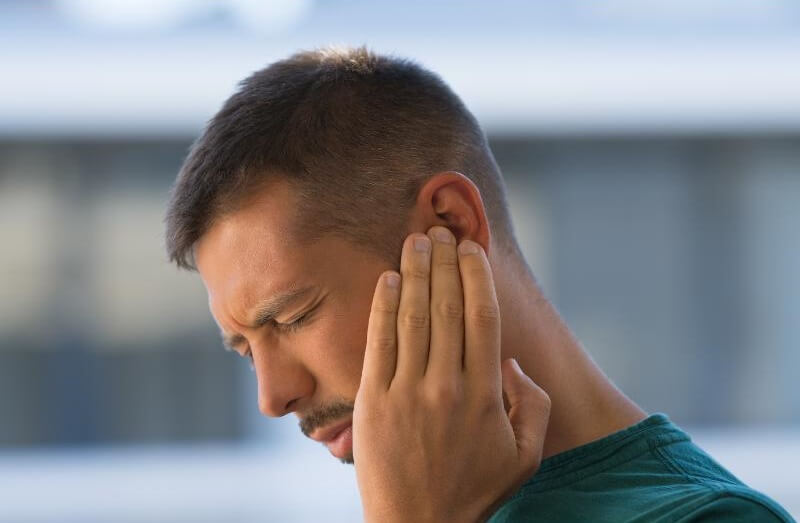Subjective tinnitus
The most common type, where only the sufferer hears the sounds. It can be caused by problems in the ear or the hearing nerve’s communication with the brain.
Ringing in the ears, also known as tinnitus, is a condition often linked to hearing loss. It can be triggered by factors like loud noise exposure, aging, ear infections, and injuries. Tinnitus manifests as the brain's response to the loss of hair cells in the ear, producing sounds such as ringing, hissing, roaring, or buzzing.

Tinnitus is the perception of noise or ringing in the ears without an external sound source. These sounds can vary widely, including buzzing, humming, hissing, or whistling. Tinnitus can occur in one ear (unilateral) or both ears (bilateral) and can be persistent or intermittent.
Tinnitus is very common and affects people of all ages. *Approximately 30% of people will experience short-term tinnitus at some point in their lives, and around 13% live with persistent symptoms. It is more prevalent among individuals with hearing loss or other ear problems, but it can also affect those with normal hearing.
Tinnitus can sound different to each person, but common descriptions include:
• Ringing
• Buzzing
• Whistling
• Humming
• Hissing
• Grinding
These noises may be constant or vary in volume. Some people also experience dizziness, vertigo, and fatigue, which can be associated with tinnitus.
Tinnitus can be caused by various factors, including:
• Earwax build-up
• Ear infections
• Noise-induced hearing loss
• Age-related hearing loss
• Ménière’s disease
• Multiple sclerosis
• Certain medications
• Head or neck injuries
Recent studies have shown that people with tinnitus have been under stress more often than other people with ear, nose or throat problems. Tinnitus can be linked to long-term stress like work-related worries, or to a larger one-off incident such as a family bereavement.
Tinnitus could be a side effect of certain medication. Some some antidepressants and malaria treatments may trigger it. Certain types of pain relief, rheumatism medication and oral treatments for blood pressure could also play a part.
Loud noise is the most common trigger for tinnitus. If you regularly spend time in a noisy environment for years hearing protection, you’re at a much higher risk of developing tinnitus. It can also be brought on by a sudden, very loud noise.
Click here to read our section about hearing protection.
Some hearing experts believe that alcohol and nicotine are linked to tinnitus.
SilentCloud offers clinically-proven solutions for tinnitus relief, empowering you to take control from the comfort of your home. Access personalised therapies, sound therapy, and informative content to guide you on your journey to a quieter life.
With SilentCloud's user-friendly app, managing your tinnitus is effortless. Say goodbye to constant ringing and hello to a more peaceful life with SilentCloud.
Try Silentcloud
Tinnitus can significantly affect quality of life, causing:
Sleep problems: Difficulty sleeping due to constant noise.
Concentration issues: Trouble focusing on tasks.
Emotional impact: Anxiety, irritability, and sometimes depression.
Dizziness and balance problems: Related to inner ear issues.
If you suspect you have tinnitus, consult with your GP or an audiologist. They may ask questions about your symptoms and perform tests to diagnose and assess the severity of the condition. This might include a hearing test to evaluate different frequencies and volumes or a physical examination of the ears.
While there is no single cure for tinnitus, various treatments can help manage the symptoms:
Hearing aids: amplify external sounds to make tinnitus less noticeable and can include sound therapy features to mask tinnitus sounds.
Sound therapy: uses white noise or other sounds to mask tinnitus, with options including sound machines, apps, and hearing aids with built-in sound generators.
Cognitive behavioral therapy (CBT): helps change the way you perceive tinnitus.
Tinnitus retraining therapy (TRT): combines sound therapy with counseling to help you habituate to tinnitus.
Medications and supplements: certain medications and supplements, like B12 and zinc, may provide relief.
Lifestyle changes: stress reduction techniques such as yoga and meditation, as well as avoiding loud noises and wearing ear protection.
• Reduce stress and find a relaxation technique that suits you (autogenic training, yoga, tai chi, etc.).
• Stop smoking.
• Watch what you eat and consume alcohol in moderation.
• Lead an active lifestyle and exercise. Physical activity helps reduce stress and distracts you from the sounds in your ear.
• Get enough sleep. Well-rested people perceive chronic tinnitus less intensely.
• Engage in activities you enjoy to distract you from the noises.
• Always wear hearing protection when you are exposed to noise or loud music.